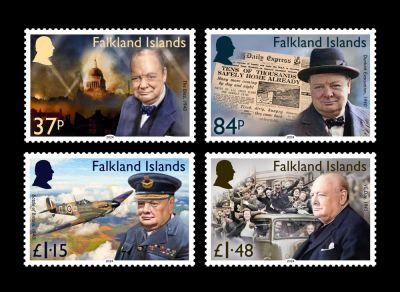
Although Churchill was a statesman, military officer, writer (receiving a Nobel Prize for Literature in 1953), amateur artist and devoted father, he is generally viewed as the victorious wartime leader who defended liberal democracy against the spread of fascism, and as a liberal reformer who spurred the creation of the modern welfare state. Historians and the British public often rank Churchill as one of the greatest prime ministers in British history, serving from 1940 to 1945 (during WW2) and again from 1951 to 1955. Apart from a brief period from 1922 to 1924, he was a member of Parliament from 1900 to 1964.
Of mixed English and American parentage, Churchill was born in Oxfordshire into the aristocratic Spencer family. However, by the standards of his social class, he was not especially wealthy and spent much of his life on the brink of debt and bankruptcy. From a young age he aspired to become a great man, believing that without a great deal of money to his name he would first have to become a hero.
He achieved this by literally throwing himself at life. Prior to WWI he had participated in 4 wars with great bravery. As a war correspondent during the 2nd Boer War he had already achieved some fame when his capture and subsequent escape through 300 miles of enemy territory attracted a great deal of publicity. Throughout that war, he publicly chastised anti-Boer prejudices, calling for them to be treated with "generosity and tolerance", and afterwards urged the British to be magnanimous in victory. In 1898, as a 23-year-old, he even participated in the last major cavalry charge of the British Army, at the Battle of Omdurman. At the outbreak of WW1 Churchill was serving as First Lord of the Admiralty. However some questionable decisions saw him demoted and after resigning from Government, he served as an officer on the Western Front before being appointed Minister of Munitions.
When he became Prime Minister in 1940, he believed that everything in his life up until that point was simply in preparation for that moment.
In the 1930’s, Churchill was one of the first to warn of the threat posed by the rise of the Nazis in Germany. At a time when appeasement was popular, he was ridiculed in the House of Commons and his speeches kept off the airwaves by the BBC. Ultimately, he was proven to be right and became the great war leader who oversaw the survival of Britain during the terrible period from the evacuation of Dunkirk until the end of 1941 when Russia and the USA joined the war. Ultimately Churchill triumphed and, in this regard, he was central to saving Western Civilisation.
Despite his eventful life and career, he is most remembered as Prime Minister during the war years, a time when fiercely supportive Falkland Islanders donated more money per head for the purchase of Spitfires (10) than any other nation. Churchill had very direct and interesting links to the Falkland Islands. In 1942 he dispatched 1,700 troops from the West Yorkshire Regiment to the Islands out of concern that the Japanese were planning to invade the territory and interfere with critical sea routes in the South Atlantic. In support of this plan Tokyo, allegedly, was prepared to hand control of the Islands to Argentina. Churchill realized the strategic importance of the Falklands after Japan's attack on Pearl Harbor on December 8, 1941.
In a message to senior defence officials in London dated 1 April, 1942, Churchill stated, “It would be a very serious thing to lose the Falkland Islands to the Japanese and no comfort to say that it would hurt the United States more than ourselves. The Falkland Islands are very well known and their loss would be a shock to the whole Empire,” he wrote. “They would certainly have to be retaken.”
“The object of the reinforcement would be to make it necessary for the Japanese to extend their attacking forces to a tangible size,” Churchill wrote. “This might well act as a deterrent.” As he expected, the Japanese threat to the Falklands failed to materialize and by late 1944 the troops had been dispatched to different theatres of the war.
During his second stint as prime minister, Churchill remained concerned about the security of the Islands and other British territories in the south Atlantic resulting in the deployment of HMS Snipe. In a personal minute to defence chiefs Churchill said: "Certainly a frigate should be kept in the neighbourhood of the Falkland Islands."
|
Technical Details |
|
|
Designer/illustrator |
Andrew Robinson |
|
Photography |
84p Portrait Churchill Archives Centre £1.48 Background and portrait © IWM |
|
Printer |
Cartor Security Printing |
|
Process |
Lithography |
|
Stamp Size |
42 x 28mm |
|
Perforation |
13 ¼ x 13 ½ per 2cms |
|
Sheet Layout |
10 |
|
Release date |
27 November 2024 |
|
Production Co-ordination |
Creative Direction (Worldwide) Ltd |
